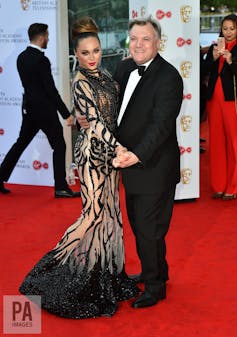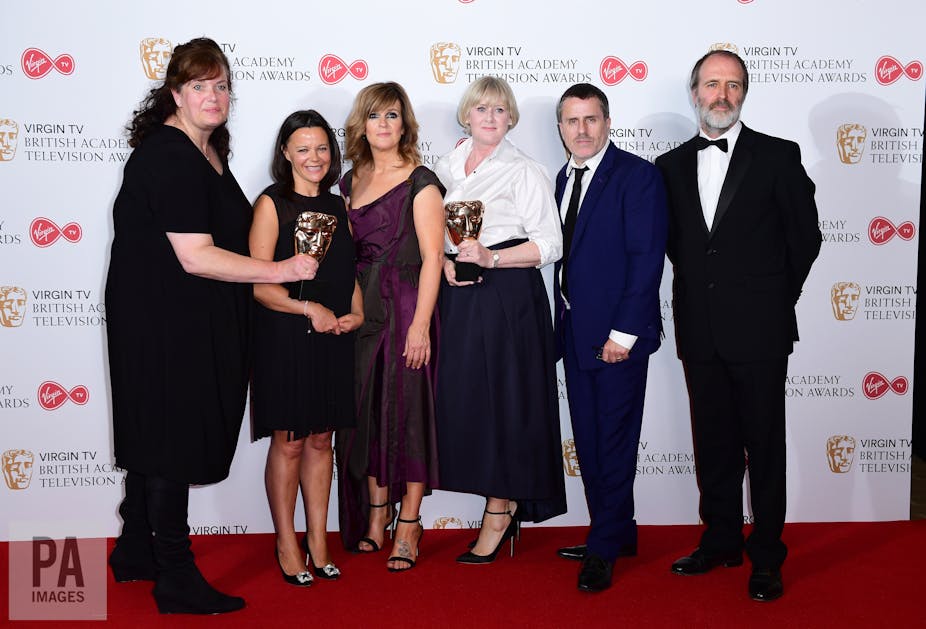The big question of this year’s BAFTAs was how many awards Netflix would romp home with. Most of the industry attention was focused on the way the various subscription video on-demand services have grown to prominence over the past few years and most people expected Netflix’s much-lauded £100m drama, The Crown, to walk away with a hatful of awards – after all, it dominated with five nominations, including best drama, and for three of its actors.
But it wasn’t to be. On the night the spoils went to the BBC’s Happy Valley, which was made on a fraction of The Crown’s budget and which walked away with best drama series, while Sarah Lancashire won best actress. Damilola, Our Loved Boy – the BBC true-crime drama, which retold the story of Damilola Taylor’s tragic murder and his family’s fight for justice – also won two two awards. It was part of a dominant night for the public broadcaster which won awards in 18 categories, putting paid to predictions that this would be a trophy year for Netflix and its subscription stablemates.
But these are new big players in blue-chip content and their time will surely come. Gaining millions of new viewers each year and producing ever more of their own award-winning productions, Netflix, the market leader, is now in nearly a quarter of British households. BAFTA’s decision to remove the rule that 50% of all funding for a series and creative control had to come from the UK meant that dramas such as The Crown could compete on a level playing field whereas previously it could only have featured in the international category.
Not all viewers were happy about these changes. After the nominations were announced, many took to Twitter to argue that The Crown and others should be in a new streaming category. But I think the impact these blockbuster series are having is hard to ignore if a contemporary award programme is to stay relevant. The best must compete with the best.
Keeping it nice
Most of the recent controversy had been got out of the way by the night itself. There had been much comment when Tom Hiddleston, who earlier won a Golden Globe for his starring role in The Night Manager, failed to garner even a nomination at the BAFTAs. Similarly there was a deal of head-scratching that the stand-out hit series Line of Duty – which attracted 8m viewers for its final episode – was only up for one gong.
According to the Guardian, some of the seemingly strange nominations were down to the rule that only one piece of material could be submitted by each contender. This meant that, while a one-off TV drama could be entered in its entirety, judges were only allowed to view and assess a single episode of a multi-part drama. This might shed light on why Benedict Cumberbatch was nominated for his title role in Richard III, while Hiddlestone was not – judges had only seen a sixth of his work on The Night Manager.
Anyone hoping for overtly political speeches in this election year would have been disappointed. One wonders whether the reports that BAFTA had emailed nominees asking them to offer “a short anecdote or an interesting detail about the production in their victory speeches” might have had something to do with that. As it turned out, host Sue Perkins – of Great British Bake-Off fame – had the best line of the night, introducing the best leading actress category: “This award represents what so many actresses aspire to – being paid just under the same amount as the leading actor”.
Meanwhile, James Nesbitt – who presented the award – made an impassioned speech to promote the cause of Equal Representation of Actresses and noted that inequality on screen (there are three male leading roles for every female role) “is an inequality that is absorbed by everyone on their screens every day”. He added: “As the father of two children - two girls - this should change.” Hear hear.
Ed Balls, Gangnam-style
Just over a year after BBC3 went online only, it was feared that the channel’s knack for developing such little gems as Gavin & Stacey might have been lost, but a win for its scripted comedy, People Just Do Nothing, will go some way towards proving the doubters wrong.

The other highlight of what was actually a fairly tame night was Virgin TV’s “must-see moment” gong which gave us, among other highlights, Ed Balls dancing in “Gangnam-style” on Strictly Come Dancing as well as Michelle Obama doing Carpool Karaoke with James Corden and the great snake vs iguana chase from Planet Earth II. Great news for iguana fans everywhere as the thrilling death chase carried off the honours.
So it was actually a pretty life-affirming night for those people who consider that the “entertain” part of the BBC’s mission to “inform, educate, entertain” should remain at the centre of the broadcaster’s core values. We will, of course, continue to see the rise and rise of Netflx and video on-demand, there’s simply too much money involved for this not to happen.
But I went to bed happy in the knowledge that the BBC can still create vivid, powerful and popular programmes. And, of course, with the indelible image of Ed Balls dancing Gangnam-style burned on to my eyelids. And that’s going to be hard to shift.


